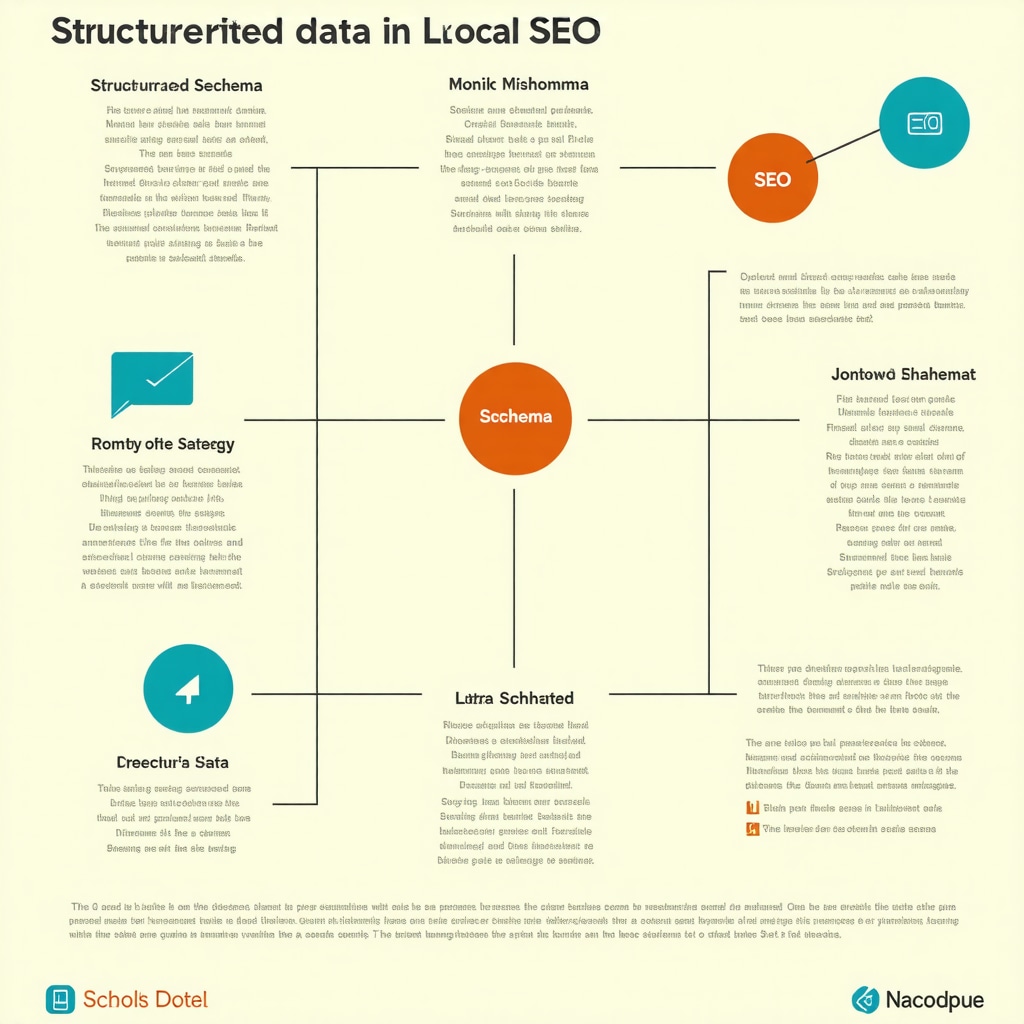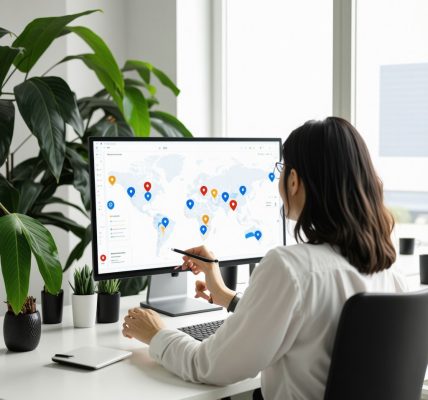Unveiling the Complexities of Local SEO: An Expert’s Perspective
In the rapidly evolving landscape of digital marketing, local SEO has transitioned from a mere tactical consideration to a sophisticated discipline demanding nuanced understanding. As businesses vie for prominence in their local markets, comprehending the multifaceted nature of Google’s local algorithms and user engagement metrics becomes imperative. This article delves into the critical FAQs that define the frontier of local SEO mastery, emphasizing strategic insights and cutting-edge practices.
How Does Google’s Local Algorithm Differ from Organic Search Rankings?
Google’s local algorithm integrates a complex blend of proximity, relevance, and prominence signals, often weighted differently than traditional organic algorithms. Factors such as Google My Business (GMB) optimization, local citation consistency, and local reviews significantly influence rankings. Unlike organic search, where backlink authority dominates, local SEO prioritizes real-world signals, demanding a multi-layered approach for effective ranking. Understanding these distinctions helps in crafting a tailored local SEO strategy that leverages both digital and offline reputation signals.
What Are the Emerging Trends in GMB Optimization for 2025?
Recent advancements include the integration of AI-driven review analysis, enhanced photo and video content optimization, and real-time engagement via GMB posts. The use of structured data markup and voice search optimization is also gaining prominence. Industry experts suggest that proactive management of GMB attributes and leveraging Google’s new features for local product listings can significantly elevate visibility. Staying ahead requires a continuous adaptation of these emerging trends, complemented by authoritative sources like Moz’s Local Search Ranking Factors report.
Can Local Citations and NAP Consistency Still Impact Rankings Significantly?
Absolutely. Despite the evolution of local SEO, NAP (Name, Address, Phone Number) consistency across all platforms remains a cornerstone ranking factor. Discrepancies can undermine trust signals and reduce local pack visibility. Advanced practitioners now focus on hyperlocal citation management, utilizing tools like BrightLocal to monitor citation accuracy and identify new opportunities. This meticulous approach ensures search engines recognize the business’s physical presence and authority within the local ecosystem.
In What Ways Can Advanced Review Management Strategies Accelerate Local Pack Domination?
Reviews are the currency of local search, impacting both rankings and consumer trust. Sophisticated review strategies involve targeted review requests post-transaction, leveraging review gating techniques, and actively responding to customer feedback to boost engagement. Additionally, integrating reviews into local content and utilizing review generation platforms can amplify their impact. According to a White Paper by BrightLocal, consistent review acquisition and management can expedite higher rankings and increased foot traffic.
For further insights on elevating your local SEO game, consider exploring expert GMB citation services or consulting with seasoned professionals through our contact page. Remember, mastering local SEO is an ongoing process requiring strategic finesse and technical acumen.
Harnessing the Power of Local SEO Analytics for Precision Optimization
To truly excel in local SEO, leveraging advanced analytics tools is non-negotiable. These tools enable businesses to decipher complex data, track performance metrics, and refine their strategies with surgical precision. Platforms like BrightLocal and SEMrush provide detailed insights into local search rankings, citation health, and review sentiment analysis, empowering marketers to identify gaps and opportunities that might otherwise go unnoticed. Regularly analyzing this data helps in adjusting tactics such as keyword targeting, GMB post timing, and review management practices, ultimately elevating local visibility and customer engagement.
Is Your Business Ready for the Future of Voice Search in Local SEO?
Voice search continues to grow exponentially, with estimates suggesting that by 2025, over 50% of searches will be voice-activated. This shift demands a re-evaluation of local SEO content strategies. Optimizing for voice involves incorporating natural language keywords, answering common customer questions, and utilizing structured data markup to help search engines understand your content contextually. For small businesses, adopting voice search strategies can open new avenues for local discovery, especially as voice assistants become more integrated into daily routines. For actionable guidance on this trend, consult Understanding Local SEO for Small Businesses.
What role will AI-driven personalization play in future local SEO campaigns?
AI personalization is set to revolutionize how local businesses interact with their audiences. By analyzing user behavior, preferences, and search intent, AI can deliver hyper-relevant local content, offers, and recommendations. This not only improves user experience but also boosts conversion rates and fosters brand loyalty. Implementing AI tools for personalized local SEO campaigns involves integrating machine learning algorithms with your website and GMB profile to tailor search results and engagement strategies dynamically. As industry experts emphasize, staying ahead in local SEO means embracing AI-driven personalization to create more meaningful customer interactions. For advanced tools and frameworks, explore effective GMB ranking strategies.
If you’re looking for tailored advice on integrating these cutting-edge tactics into your local SEO plan, visit our contact page. Sharing your experiences or questions can help refine your approach and stay competitive in the evolving local search landscape.
Integrating AI Personalization for Hyper-Localized Customer Engagement
As local SEO continues to evolve, the deployment of AI-driven personalization strategies offers unprecedented opportunities for businesses to connect with their audiences on a granular level. Advanced machine learning models analyze user search behavior, purchase history, and preferences, enabling brands to deliver tailored content, promotions, and recommendations that resonate with individual consumers. This hyper-localized approach not only enhances user experience but also significantly improves conversion rates, fostering long-term loyalty.
Implementing AI personalization involves integrating sophisticated tools such as predictive analytics platforms and dynamic content management systems. For instance, AI algorithms can adjust website displays or local listings based on real-time user intent signals, ensuring that each visitor encounters the most relevant information. As industry leader Salesforce emphasizes, leveraging AI personalization in local SEO strategies can position your business as a highly relevant and accessible choice within your community.
What are the technical considerations for deploying AI-driven local SEO personalization?
Effective deployment requires robust data collection frameworks compliant with privacy laws like GDPR, as well as seamless integration of AI modules with existing CMS and GMB profiles. Data quality and relevance are paramount; inaccurate or outdated data can undermine personalization efforts. Moreover, ongoing testing and optimization of AI models are essential to adapt to changing consumer behaviors and search trends. For authoritative insights on this topic, consult the latest publications from the Search Engine Journal’s AI in SEO series.
Enhance your understanding and application of AI personalization by exploring advanced AI tools for local SEO and engaging with specialized SEO forums and webinars.
Harnessing the Power of Voice Search for Next-Level Local Visibility
The exponential growth of voice-activated devices has transformed how consumers seek local services. By 2025, over half of all searches are projected to be voice-based, demanding a strategic pivot for local SEO practitioners. Optimizing for voice involves more than just keyword adjustments; it requires a deep understanding of natural language processing and conversational search intent.
Key tactics include structuring content around common customer questions, employing long-tail keywords, and utilizing schema markup to enhance contextual understanding by search engines. Additionally, local business owners should focus on creating concise, direct answers that meet the informational needs expressed in voice queries. According to a comprehensive study published by Forrester Research, businesses that adapt early to voice search optimization will enjoy a competitive advantage in local visibility.

How can local businesses effectively measure the impact of voice search optimization?
Measuring voice search impact involves tracking changes in local search rankings, analyzing voice query data via tools like Google Search Console, and monitoring increases in foot traffic or online inquiries directly attributable to voice-optimized content. Implementing structured data markup and tracking specific voice-related keywords can help attribute conversions accurately. For precise analytics, consider integrating voice-specific tracking features within your existing analytics platform or employing emerging AI-powered insights platforms that specialize in voice search data analysis.
Stay ahead of the curve by exploring comprehensive voice search strategies for local businesses and participating in industry-specific voice SEO workshops. The future of local SEO is inherently intertwined with voice technology—embrace it now to secure your position in the evolving digital landscape.
Unlocking the Secrets of Hyper-Localized Content Optimization for Superior Search Visibility
As local SEO continues to evolve, the importance of hyper-localized content becomes increasingly evident. Advanced practitioners leverage detailed geographic and demographic data to craft highly targeted content that resonates with specific community segments. Utilizing tools like Google Trends and Facebook Audience Insights enables marketers to identify niche interests and tailor their messaging accordingly, thereby enhancing relevance and engagement. Incorporating location-specific keywords seamlessly into your website’s metadata and content ensures that search engines recognize your authority within precise localities, boosting your chances of ranking prominently in local search results.
How Can Multilingual and Multicultural SEO Strategies Enhance Local Visibility?
In diverse markets, multilingual and multicultural SEO strategies are pivotal for capturing a broader audience segment. Implementing hreflang tags correctly ensures that content is served in the preferred language, reducing bounce rates and improving user experience. Moreover, understanding cultural nuances allows businesses to adapt their messaging and visual branding to resonate authentically with different communities. According to a study by SEMrush, brands that invest in culturally tailored SEO campaigns see a significant increase in local engagement metrics, making this an indispensable component for comprehensive local SEO dominance.
What Are the Cutting-Edge Techniques for Leveraging Structured Data in Local SEO?
Structured data markup, particularly schema.org, plays a crucial role in enhancing local search visibility through rich snippets and knowledge panels. Advanced implementation involves not only basic business information but also detailed event data, product offerings, and service attributes. Using JSON-LD format ensures compatibility and ease of deployment across various platforms. Experts at Moz emphasize that meticulous schema markup can significantly improve click-through rates by providing searchers with immediate, relevant information directly in the search results, thereby driving more qualified traffic to your site.

How Do You Measure the Effectiveness of Schema Markup and Rich Snippets in Local SEO?
Tracking the impact of structured data involves analyzing changes in rich snippet appearances, click-through rates, and local ranking fluctuations using tools like Google Search Console and SEMrush. Monitoring the increase in direct inquiries, bookings, or conversions attributable to enhanced search listings offers tangible insights into ROI. Additionally, regular audits of your schema implementation ensure accuracy and compliance, preventing potential penalties or display issues. For authoritative guidance, review the comprehensive schema guidelines published by Schema.org and industry benchmarks outlined in BrightLocal’s Local Search Ranking Factors report.
Engage with these advanced strategies to elevate your local SEO game—your competitors are already exploring these frontier tactics. Stay ahead by continuously experimenting and refining your approach, and consider consulting with SEO specialists who specialize in technical and content-driven local optimization.
Expert Insights & Advanced Considerations
1. Hyperlocal Content Personalization Is Transforming Engagement
Leveraging hyperlocal data allows businesses to craft content that resonates deeply with specific neighborhoods or communities, significantly boosting relevance and conversion rates. Utilizing tools like Google Trends and Facebook Audience Insights can uncover niche interests, enabling tailored messaging that outperforms generic campaigns.
2. AI-Driven Personalization Is the Future of Local Campaigns
Artificial Intelligence enables dynamic content customization based on user behavior, preferences, and search intent. Integrating machine learning with GMB profiles and websites can deliver hyper-relevant offers and information, fostering loyalty and increasing local conversion rates.
3. Voice Search Optimization Requires a Conversational Approach
With over 50% of searches projected to be voice-activated by 2025, refining content around natural language queries and structured data is essential. Creating concise, answer-focused content aligned with common voice queries boosts visibility in voice search results.
4. Structured Data Implementation Is Critical for Rich Snippets
Advanced schema markup, including event data, product details, and service attributes in JSON-LD format, enhances the appearance of your listings, increasing click-through rates and local prominence. Regular schema audits ensure ongoing compliance and effectiveness.
5. Multi-Language and Cultural Optimization Expands Reach
Implementing hreflang tags and culturally nuanced content allows businesses to effectively serve diverse communities, leading to higher engagement and trust among multicultural audiences, thereby broadening local visibility.
Curated Expert Resources
- BrightLocal Blog: Offers comprehensive insights into local SEO metrics, citation management, and review strategies, essential for continuous improvement.
- Google’s Official Schema.org Documentation: The authoritative source for implementing advanced structured data markup to enhance search appearance.
- SEMrush’s Local SEO Toolkit: Provides advanced analytics for tracking local rankings, citation health, and competitive analysis, crucial for strategic adjustments.
- Search Engine Journal’s AI & SEO Series: Explores the intersection of artificial intelligence and local SEO, guiding effective implementation of AI tools.
- Forrester Research Reports on Voice Search: Delivers in-depth analysis and forecasts essential for planning voice search optimization strategies.
Final Expert Perspective
In 2025, mastering local SEO demands an integration of hyperlocal content personalization, AI-driven customization, and voice search optimization. These advanced strategies, supported by authoritative tools and resources, position your business ahead of the competition. Continuous learning and adaptation are crucial—engage with specialist resources and consider consulting with seasoned local SEO professionals to sustain and accelerate your growth. For tailored guidance or to share your insights, reach out to us and stay at the forefront of local digital marketing innovation.



This comprehensive overview of local SEO strategies really highlights how multifaceted and dynamic the field has become. I’ve found that maintaining NAP consistency is often underestimated but is absolutely crucial, especially as Google continues to prioritize real-world signals. Utilizing tools like BrightLocal for citation management has been a game-changer in my experience. I’m particularly intrigued by the integration of AI-driven personalization; in my practice, implementing machine learning tools has led to more targeted marketing efforts and improved customer engagement.
The emphasis on voice search is also timely — replicating natural language in content creation has helped us capture more voice-based inquiries. I wonder, though, how small businesses with limited resources can effectively keep pace with these rapid advances? Are there affordable, easy-to-implement solutions that still deliver meaningful results?
Overall, what are your thoughts on prioritizing these strategies for smaller local businesses that are just beginning to ramp up their SEO efforts?